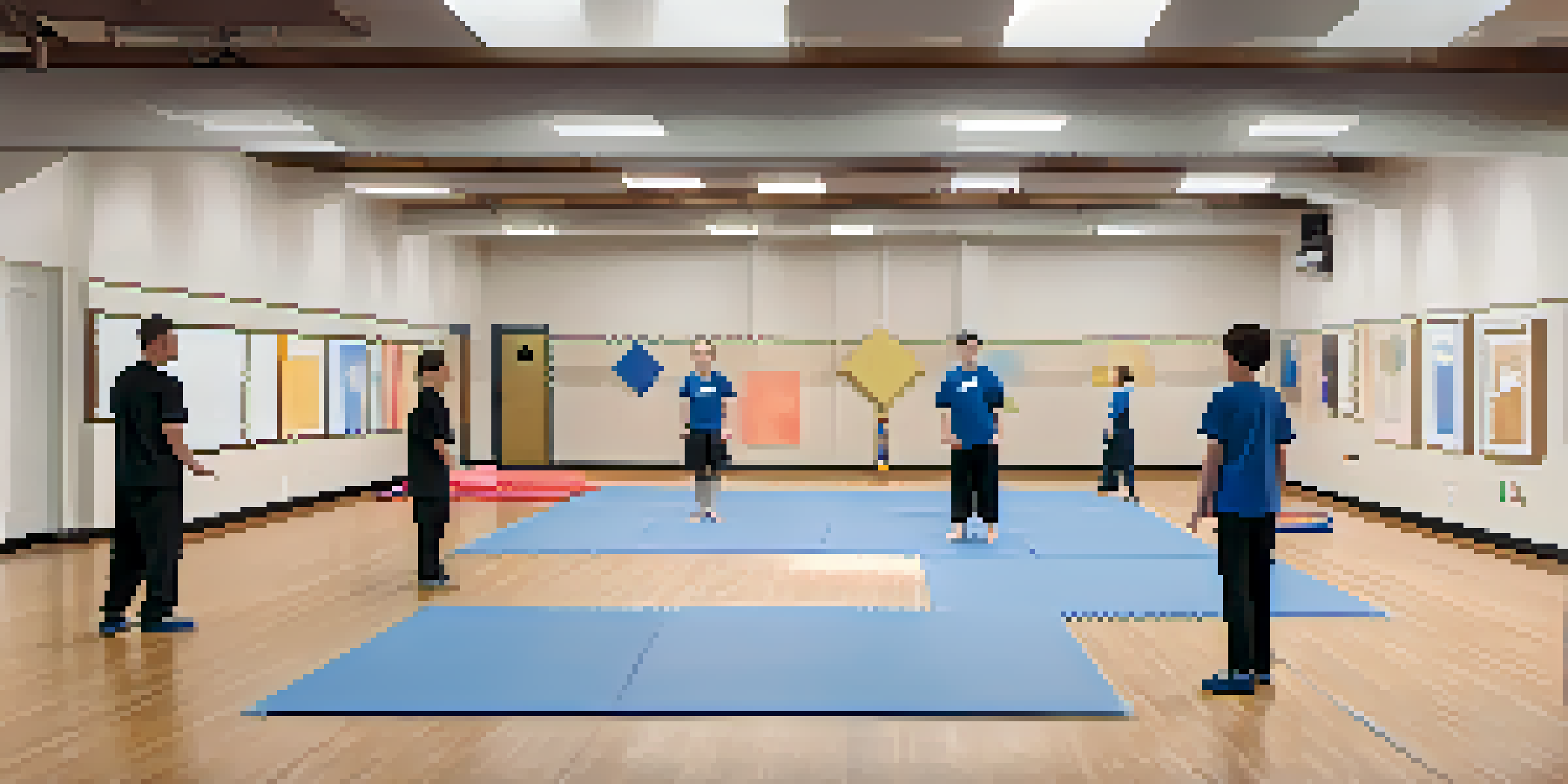Self Defense for Autism Spectrum: Techniques for Safety

Understanding the Importance of Self-Defense for Autism
Self-defense is crucial for everyone, including individuals on the autism spectrum. It empowers them to navigate potentially dangerous situations with confidence. Understanding personal safety can significantly enhance their sense of security in everyday environments, fostering independence.
Self-defense is not just a skill; it's a pathway to empowerment and confidence.
For individuals with autism, sensory sensitivities and communication challenges can complicate their ability to react to threats. Therefore, learning self-defense techniques tailored to their unique needs can be a game-changer. It provides not just physical skills but also mental preparedness.
By incorporating self-defense training into their routine, individuals can develop resilience and a sense of control. This empowerment can lead to improved self-esteem, making it easier to engage with the world around them. Overall, self-defense is more than just physical safety; it's about enhancing quality of life.
Choosing the Right Self-Defense Training Program
Finding the right self-defense program is essential for individuals on the autism spectrum. Look for classes that specifically cater to their needs, taking into account sensory sensitivities and communication styles. Programs focusing on practical techniques and a supportive environment can make a significant difference.

Consider programs that offer a gradual introduction to self-defense concepts. This allows participants to build comfort and confidence without feeling overwhelmed. Instructors trained in working with individuals with autism can tailor their teaching methods to suit each person's learning style.
Empowerment through Self-Defense
Self-defense training enhances confidence and independence for individuals on the autism spectrum.
Local community centers, schools, or specialized organizations often provide such programs. Engaging with the community can also foster social skills and create a supportive network. This way, self-defense training becomes an enriching experience rather than just a means of protection.
Essential Self-Defense Techniques for Individuals with Autism
Basic self-defense techniques can be incredibly effective for individuals on the autism spectrum. Techniques such as blocking, escaping holds, and using basic strikes can be adapted to their physical abilities. The focus should be on simple, repeatable actions that can be practiced regularly.
The best way to predict your future is to create it.
Moreover, it's important to teach situational awareness. Recognizing potentially dangerous situations and understanding when to act is vital. Role-playing scenarios can help individuals become more comfortable and prepared without the pressure of real-life situations.
Additionally, incorporating verbal de-escalation techniques can be beneficial. Teaching individuals how to use their voice to defuse a situation can provide them with more tools for safety. This holistic approach to self-defense combines physical skills with mental strategies.
Building Confidence Through Practice and Repetition
Confidence plays a pivotal role in self-defense, and practice is key to building it. Regular practice of techniques helps reinforce learning and makes responses more instinctive. Setting achievable goals during training can also provide a sense of accomplishment.
Encouraging individuals to practice with family members or friends can create a supportive environment. This not only makes the practice more enjoyable but also helps them develop social skills and teamwork. It’s about turning self-defense training into a positive bonding experience.
Choosing Inclusive Training Programs
Selecting self-defense classes that cater to sensory sensitivities and communication styles is essential for effective learning.
As confidence grows, individuals may feel more empowered to handle unexpected situations. This newfound confidence can extend beyond self-defense, impacting other areas of their lives. The goal is to create a well-rounded approach to personal safety.
Creating a Safe Space for Learning Self-Defense
A safe and comfortable learning environment is crucial for effective self-defense training. Make sure the space is free from distractions and sensory overload, allowing individuals to focus on their training. A calm atmosphere can significantly enhance the learning experience.
It's important to encourage open communication during training. Participants should feel comfortable sharing their concerns or questions, which can help tailor the session to their needs. This dialogue creates a sense of trust and safety, essential for effective learning.
Incorporating breaks and sensory-friendly elements, such as soft lighting or quiet areas, can also help. Adjusting the pace and intensity of the training ensures that everyone can engage fully. A supportive environment fosters not just skill development but also emotional well-being.
The Role of Family and Caregivers in Self-Defense Training
Family and caregivers play a crucial role in the self-defense journey of individuals on the autism spectrum. Their support can greatly enhance learning and confidence. Involving them in the training process can help reinforce techniques at home, making practice a collaborative effort.
Educating family members about the specific needs of individuals with autism can increase understanding and empathy. They can learn how to provide encouragement and recognize when to step in during practice. This partnership can lead to a more comprehensive learning experience.
Family Support is Key
Involving family and caregivers in self-defense training reinforces techniques and builds a collaborative safety plan.
Moreover, families can create safety plans together, discussing what to do in various situations. Involving everyone in these discussions can also help reduce anxiety around potential threats. Together, they can build a strong foundation of safety and confidence.
Promoting Awareness and Advocacy for Self-Defense
Raising awareness about self-defense for individuals on the autism spectrum is vital. Communities can play a significant role in promoting understanding and acceptance of their unique needs. Advocacy can help ensure that self-defense training programs are accessible and inclusive.
Sharing success stories and experiences can inspire others to engage in self-defense training. Highlighting the positive impact of such programs can also encourage more individuals to participate. This not only empowers those on the spectrum but also educates the wider community.

Advocacy can extend to schools, organizations, and local governments, pushing for resources and support. By working together, we can create a safer environment for everyone. Promoting awareness fosters a culture of safety and understanding.